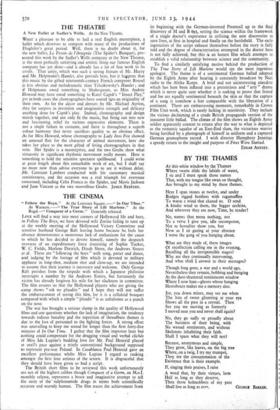THE CINEMA
Follow the Boys." At the Leicester Square.---', In Our Tillie." At Warners.--', The True Story of Lill Marlene." At the Regal.--A, Conquest of a Germ." Generally released.
LOVE will find a way into most corners of Hollywood life and here, in Follow The Boys, we have devoted wife Zorina failing to turn up at the weekly meeting of the Hollywood Victory Committee and sensitive husband George Raft leaving home because he. feels her absence demonstrates a monstrous lack of enthusiasm 'for the cause to which he has decided to devote himself, namely the despatch overseas of an expeditionary force donsisting of Sophie Tucker, W. C. Fields, Marlene Dietrich, Dinah Shore, the Andrews Sisters et al. These are "following the boys" with song, patter and dance, and judging by the footage of film which is devoted to military applause in long-shot, medium shot and close-up, we are intended to assume that their journey is necessary and welcome. Only George Raft perishes from the torpedo with which a Japanese philistine interrupts a number by the Andrews Sisters, but fortunately the victim has already forgiven, his wife for her slackness in committee. The film assures us that the Hollywood players who are giving the camp shows "ask no plaudits" and I hope they will not suffer the embarrassment of seeing this film, for it is a celluloid bouquet compared with which a simple " Plaudit " is as unfulsome as a punch on the nose.
The war has brought a serious slump in the quality of Hollywood films and one questions whether the lack of imagination, the tendency towards tedious banality and the repetition of threadbare themes is due to the loss of personnel to the fighting forces. A strong effort was unavailing to keep me seated for longer than the first forty-five minutes of In Our Time. I gather that the film improves later but nothing could compensate for the dragging visual and verbal cliches of Miss Ida Lupino's budding love for Mr. Paul Henreid played at snail's pace against a tritely conventional background supposed to represent pre-war Poland. In Casablanca Paul Henreid gave an excellent performance whilst Miss Lupino I regard as ranking amongst the first four artistes of the screen. It is disgraceful that they should have been given so bad a script.
The British short films to be reviewed this week unfortunately are not of the highest calibre though Conquest of a Germ, an M.o.I. monthly release represents a brave and imaginative attempt to tell the story of the sulphonamide drugs in terms both scientifically accurate and warmly human. The film traces the achievement from
its beginning with the German-invented Prontosil up to the final discovery of M and B 693, setting the science within the framework of a single doctor's experience in utilising the new discoveries to save lives, at first in hospital and finally on the battlefield. The early ingenuities of the script exhaust themselves before the story is fully told and the degree of characterisation attempted in the doctor hero is not fully achieved, but this is an honest film which attempts to establish a valid relationship between science and the community.
To find a similarly satisfying motive behind the production of The True Story of Lili Marlene would tax the most ingenious apologist. The theme is of a sentimental German ballad adopted by the Eighth Army after hearing it constantly broadcast by Nazi radio to the Afrika Korps. A brief and not uninteresting anecdote which has here been inflated into a pretentious and " arty " drama which is never quite sure whether it is seeking to prove that friend and foe are equally sentimental beneath the skin or that the capture of a song is somehow -a feat comparable with the liberation of a continent. There are embarrassing moments, remarkable in Crown Film Unit work, which is rarely lacking in sensitivity. They include the vicious declaiming of a crude British propaganda version of the innocent little ballad. The climax of the film shows an Eighth Army soldier apparently content to return after the war to what is depicted as the romantic squalor of an East-End slum, the victorious warrior being fortified by a photograph of himself in uniform and a captured German gramophone record. I wish director Humphrey Jennings a speedy return to the insight and purpose of Fires Were Started.
EDGAR ANSTEY.






















 Previous page
Previous page